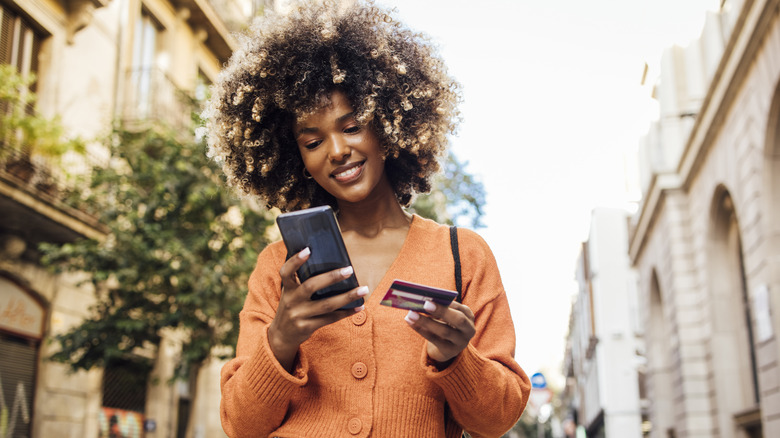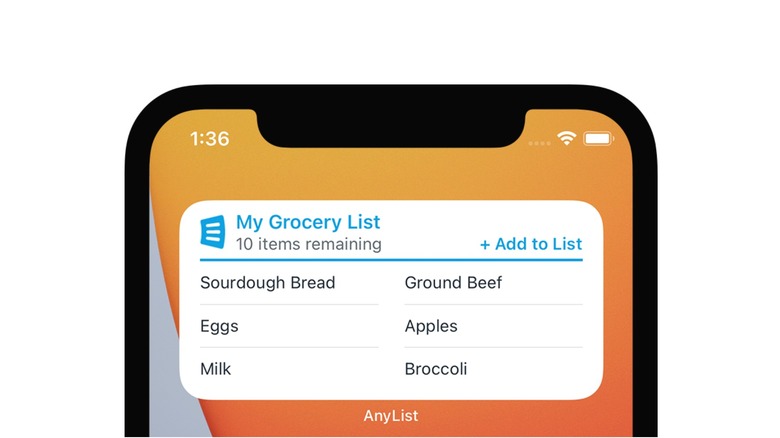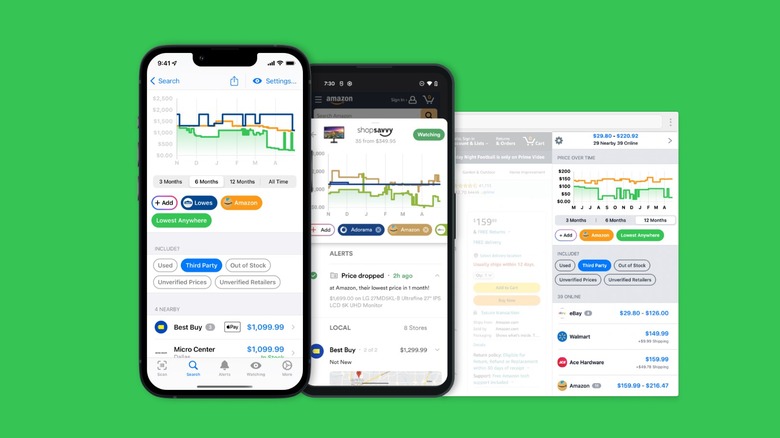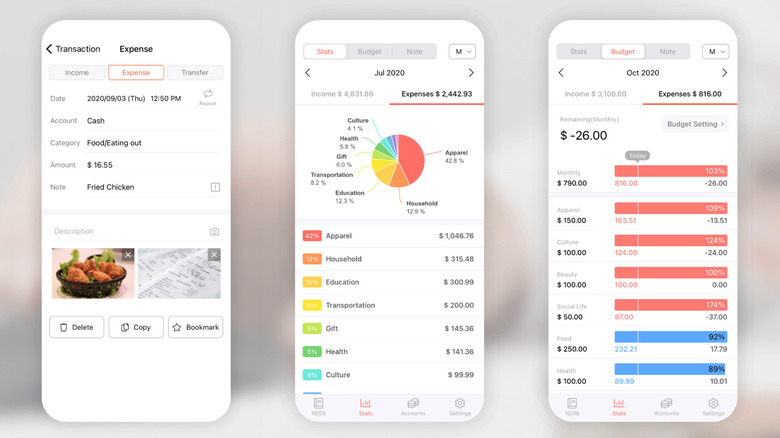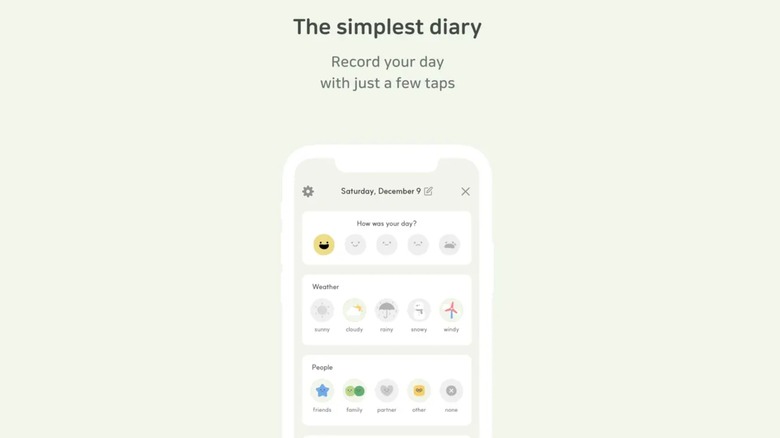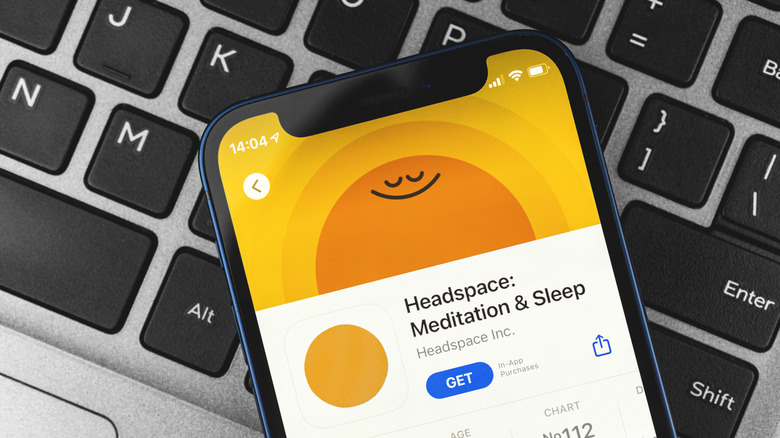5 Of The Best Apps To Stop Impulse Shopping
Fresh out of the holidays, many of us (and our wallets) are still reeling from the season of overconsumption. From having too much to eat, chugging an absurd amount of drinks, to buying way more than we need — the sobering post-yuletide evaluation of your life is bound to hit at some point. The Christmas season tends to feed into our impulses in more ways than one, especially when it comes to shopping.
In 2022, a Slickdeals survey revealed that 73% of its respondents said that most of their purchases tend to be spontaneous. The study with over 2,000 American adults shared that the average person spent $314 per month on impulse purchases, which is up 72.3% in just two years. Although part of this is the rising costs of goods in general, it's also important to factor in how the frequency of impulse purchases makes a difference.
Not to mention, impulse shopping doesn't just affect your finances, but it can also cause unnecessary clutter build-up in your home. In 2017, MJ Rosenthal, a professional organizer from Newton, claimed that the average American home contains 300,000 items (via The Boston Globe). Knowing this, it's unsurprising that the self-storage industry is worth $29 billion in 2023.
Clutter comes with a mental cost, having a profound effect on everything from our mood to self-esteem and even stress levels. So, if you want to get back on track with your finances and say goodbye to the unnecessary mental load, here are some apps that can help.
AnyList
Although buying more than you need may not seem like such a big deal, it can lead to disastrous consequences if done consistently for years, especially if it leads to hoarding. Excessive hoarding can affect air quality in your home, cause emergencies, and prevent first responders from providing necessary care. To prevent hoarding, it's best to use lists, which can help you keep track of expired goods, low stock, and urgent pantry needs.
Using AnyList, you can shop groceries more mindfully by creating recipe-based organized lists, sharing them with your housemates or family members, building mastery grocery lists, and customizing lists to match your local store's range. There's also no excuse for family members not to know the right brands because you can add photos to list items, too. Aside from this, you can passcode protect your lists and get reminders when you're near the right store.
With AnyList, you can shop online and opt for pick-up or grocery delivery directly from the app, so you will be less tempted to view unrelated items in-store or online. AnyList is available for iOS, Android, Mac, and PC. You can even access lists through Apple Watch, Siri, home screen widgets, and other smart home devices, like Alexa.
Although not as comprehensive, you can also opt to use the built-in note-taking app on your mobile phone. For example, the iOS Notes app comes with file attachments, folders, and can be accessed across your Apple account-linked devices.
ShopSavvy
While there are a lot of advantages to buying things on sale, and you deserve to treat yourself to a little something every now and then, it's not always the bargain you hope for. In some cases, retailers use psychological tricks to increase your sense of urgency to siphon money out of your wallet ASAP. For example, they sometimes create fake sales with artificially inflated original prices to make it seem like you're saving when you're actually not. To avoid falling for them, you'll need tools like price comparison apps, such as ShopSavvy.
With ShopSavvy, you can stay one step ahead of online and in-store marketers and be more level-headed in pricing in more ways than one. First, ShopSavvy has a price-comparing feature, which lets you view prices across its database of thousands of retailers. Second, it tracks prices to reveal the actual ups and downs, so you're aware if they increased the price dramatically before the "sale" to fake the difference.
Third, ShopSavvy lets you set price drops and deal alerts, which you can enable for necessities, so you don't feel compelled to buy impulsively. It also offers alerts for back-in-stock products, which is great if you're waiting for a specific brand that fits your budget and needs.
ShopSavvy is available on iOS (iPhone, iPad, Mac, and Apple Watch) and Android. For users prone to online shopping on their computers, ShopSavvy can also be accessed via Safari, Edge, and Chrome browser extensions.
Money Manager
With Money Manager, you can track your daily, weekly, monthly, and annual cashflow through self-reported information that is manually logged. When used properly, it can be a tool to track your total net worth and keep you mindful about your overall financial position.
Money Manager's budget tracking feature is great for being able to holistically visualize the impact of your overspending in other areas of your life. With its colorful visual design with pie charts and color-coded graphs, it can quickly show your personal savings and spending trends. By being able to view your real expenses versus your budget by category, you can see how much your impulse shopping impacts your ability to pay for necessities or long-term goals.
Additionally, if you're a frequent traveler, you may be a victim of the "money isn't real when I'm on vacation" mentality. Thankfully, Money Manager lets you add multiple currencies to its cashflow logs, that lets you view the final amount in your native currency. So, there's really no excuse for unnecessarily splurging, just because you're lazy to convert currencies. Not to mention, you can add photos and descriptions to each expense, which helps you remember what you've spent on meaningfully (or impulsively).
Money Manager is available on iOS and Android for free. However, if ads tend to bother you and you don't want account limits, the paid version may well worth the money you save. Money Manager's paid tier is available for $19.99 annually or $2.49 per month.
DailyBean
If you find yourself impulse shopping after a tough day at work or school, your buying problem may be because you're using it as a self-soothing tool. To know if you've been using shopping in this manner, you can use a journaling app like DailyBean.
After downloading DailyBean for the first time, you are asked to select the information you want to record. To configure your DailyBean journal to track impulse spending in particular, enable emotions, events (shopping), school, and work. By spending a few seconds a day to click the icons corresponding to what happened that day and your mood, you can understand how your impulse spending habits are affected by your lifestyle.
After several months of use, you'll see trends of frequently recorded activities with each mood through its monthly and annual analysis charts. Then, you can work towards removing or reducing your impulse shopping triggers to reduce the frequency of it happening. To make the analysis as accurate as possible, don't forget to enable log reminders to get daily notifications.
DailyBean is available for free on iOS (iPhone and iPad) and Android (Phone, Tablet, and Chromebook). However, if you want more custom themes with more interesting colors, you can opt for its $3.99 monthly or $19.99 annual pass. DailyBean also offers 7-day free trials, and the best part is they don't automatically charge you once it is over.
Headspace
In its annual poll, a Slickdeals study revealed that 61% of its survey takers felt a sense of happiness after randomly buying something. The 2022 study also shared that just as many respondents believe that shopping can instantly turn around a bad day. This isn't necessarily bad unless it begins to negatively impact your life.
Alternatively, when you're feeling down, you can shift your attention to an app that can be overall healthier to your well-being, like Headspace. Using a variety of tools, such as evidence-based meditation, mental health coaching, and psychiatry, Headspace can help you give the right tools to become more resilient during difficult times.
Although Headspace does have a free tier, podcasts, and a YouTube channel wherein it publishes meditations, it doesn't have as much free content. So, if you want to access more meditations, standard pricing is $12.99 billed monthly, but you can save a little by availing of its $69.99 annual fee. To see if it's worth it, you can also try its seven-day or 14-day free trial.
Headspace does have regular promotions for its subscriptions throughout the year, so you can wait until they come up before committing. On the other hand, it offers more affordable annual plans for students ($9.99) and families of up to six people ($99.99). If you're a K-12 educator from the United States, United Kingdom, Canada, and Australia, you may also be eligible to get Headspace for free.
Regain control of your shopping habits
In a 2017 Boston Globe interview, Peter Sterling, a neuroscience professor at the University of Pennsylvania School of Medicine, shared that a sustainable future depends on people finding satisfaction in experiences, not stuff. In a time when overconsumption is so common, stopping yourself from impulse shopping can be challenging. In a moment of weakness, you can easily order something within a few seconds using just your phone.
Thankfully, the same technology used to get us to impulsively shop can also be used to prevent it. Using the apps above, you can make an effort to make shopping fun again without ruining yourself financially. After all, shopping isn't a bad thing, as long you're mindful about each purchase and how it can add value to your life.
Aside from installing new apps to stop you from impulse shopping, removing a few apps can also make a difference, such as social media platforms with influencers that encourage you to overspend or online shopping apps. Alternatively, you could just mute people on Instagram, turn off notifications from shopping apps, or set online shopping window times to avoid temptation.
While some of us participate in the act of impulse shopping intermittently, it can be a real form of addiction for others. If you suspect that you or someone close to you may be experiencing an actual addiction to shopping, you may want to consider consulting with a licensed professional for the appropriate treatment options.
